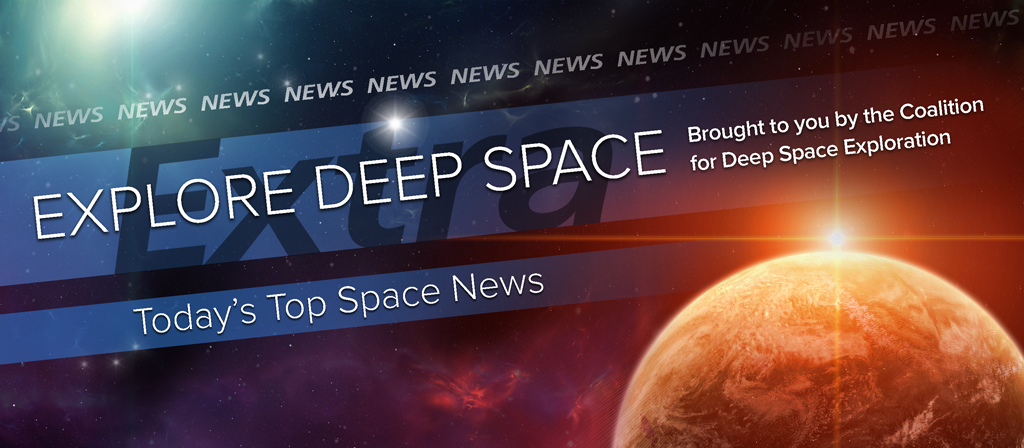Today’s Deep Space Extra offers the latest reporting and commentary on space related activities from across the globe. Though risky, human space exploration is worth the challenge, according to a South Carolina editorial. Popular astrophysicist Neil deGrasse Tyson says government rather than private sector leadership is a key to human deep space exploration. NASA is tackling the development of habitats for astronauts living in deep space. DSCOVR’s Earth observations will contribute to the search for extraterrestrial life. Einstein’s Theory of Relativity marks its 100th anniversary. Aroma comes to coffee in space. President Obama is on the verge of signing new commercial space legislation. NASA’s water recycling/purification technologies are finding commercial applications. Blue Origin celebrates New Shepard’s vertical landing, a significant advance for reusable rockets. XCOR makes changes at the top.
Human Deep Space Exploration
Space exploration worth risks
Post and Currier, of Charleston, S.C. (11/25): The early exploration of Mars will require significant technical strides, according to an editorial that concludes the many advances will not overcome all of the risks faced by the red planet’s first human visitors. “Their bravery will hopefully lead to one of mankind’s greatest achievements in exploration,” according to the editorial.
Neil deGrasse Tyson: ‘The delusion is thinking that SpaceX is going to lead the space frontier’
The Verge (11/24): The popular astrophysicist explains why the commercial space sector is unlikely to lead the human exploration of Mars: the great expense, the danger and the absence of an early return on investment. “A government has a much longer horizon over which it can make investments,” says Tyson. “This is how it’s always been. And the best example, I think, is Christopher Columbus. That was not a private mission.”
NASA considers uses for cislunar habitat
Space News (11/24): NASA embraces plans to develop a space habitat beyond the six person International Space Station. After initially supporting astronauts in the space between the Earth and the moon, the habitat would house the explorers who journey from the Earth to Mars.
Unmanned Deep Space Exploration
Could DSCOVR help in the hunt for exoplanets?
Spaceflight Insider (11/24): Launched in February to monitor solar activity for the U.S. Air Force, NOAA and NASA and acquire “full disk” images of the Earth, the DSCOVR satellite may have new value. DSCOVR’s sensitive measurements of the Earth may be useful data in determining whether planets beyond the solar system are habitable.
Einstein’s General Relativity at 100: Put that in your pipe and smoke it
Washington Post (11/24): Albert Einstein’s Theory of General Relativity marked its 100th anniversary this week, with Washington presentations and plans for televised commemorations.
Low Earth Orbit
Don’t spill the beans: Zero-G cup lets astronauts ‘smell the coffee’
Space.com (11/24): Strangely shaped drinking cups developed aboard the space station as part of a research project enable astronauts to sip and smell coffee in a weightless environment. Normally, the absence of gravity would require the aromatic beverage to be enclosed in a bag so that it could be sipped with a straw.
Commercial to Low Earth Orbit
Obama is about to give private space companies a big break
Fortune (11/24): President Obama is expected to sign commercial space legislation recently agreed to by the U.S. House and Senate that will ease federal regulation until 2023, provide ownership rights to U.S. citizens who discover valuable materials on asteroids and extend operations of the International Space Station through 2024.
NASA Glenn, CWRU team up to commercialize groundbreaking water purification technology
Cleveland Plain Dealer (11/24): Scientists at NASA Glenn find new ways to purify water, perhaps one of the space agency’s most far reaching contributions to human space travel as well as to the people of Earth.
Suborbital
Blue Origin launches Bezos’s space dreams and lands a rocket
New York Times (11/24): Blue Origin founder Jeff Bezos heralds the successful vertical launch and landing of his company’s New Shepard suborbital rocket this week as a game changer that will bring down the cost of space transportation. “The ultimate vision should be aircraft like operations,” said Bezos in an interview.
Blue Origin beats SpaceX in landing reusable rocket
Popular Science (11/24): Jeff Bezos’s Blue Origin this week became the first to vertically launch and land a reusable rocket, a milestone that promises to lower the cost of launching humans as well as payloads to space.
Watch: Jeff Bezos’s company Blue Origin launches and lands a rocket
Newsweek (11/24): “This is a big game-changer because it totally changes the economics of space travel,” said Blue Origin founder Jeff Bezos, after the company he leads vertically launched and landed a commercial suborbital rocket on Monday. Bezos compared expensive rockets that are used only once to flying a 747 across the country and then throwing it away.
How Blue Origin’s suborbital rocket ride works (infographic)
Space.com (11/24): Named for Mercury astronaut Alan Shepard, Blue Origin’s New Shepard suborbital rocket could help to lower the cost of space travel with reusability. Infographic reveals the details of new era of space travel.
Major management shakeup leaves XCOR’s future in question.
Spaceflight Insider (11/24): Changes at the top of XCOR leave some wondering about the suborbital company’s future direction. Two founders have departed, XCOR announced this week.

